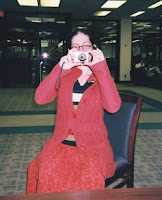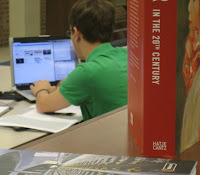We have all heard that phrase used when the person speaking is trying to get us to try something new or come up with a new idea. And, that is what the Texas Library Association was doing when they instituted the idea of Library Snapshot Day in 2010.
When it was announced that it was to be held this year and that a library could pick any day in the month of October of 2010, the Steen Research and Instructional Services Librarians decided to bring the idea to the SFASU campus and the Ralph W. Steen Library.

Disposable cameras were placed at service desk throughout the library, with signs asking users to “take a picture, and leave the camera.”

Some of the Library staff got in the act using digital cameras.


Library users were shown using the computers in the lobby and LINC,

sleeping on the new furniture in the New Books area,
attending a Library Instructional session,


getting tutoring in the AARC, etc.


So, on October 21 , 2010, we created a “snapshot” of a day in the life of Steen Library.


If you did not participate, don’t worry!






